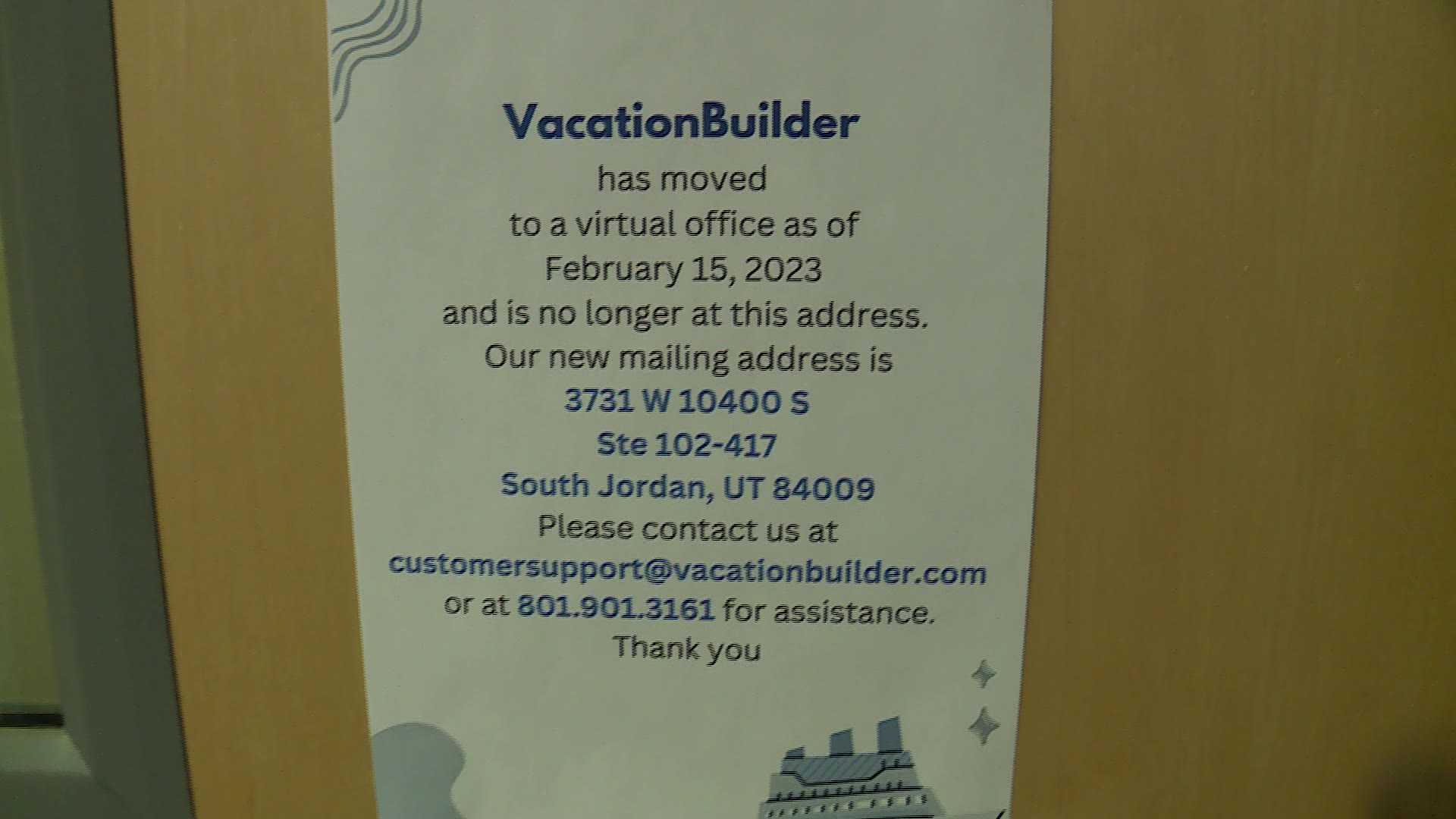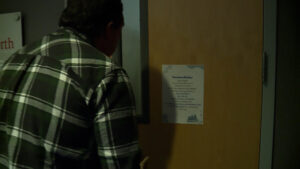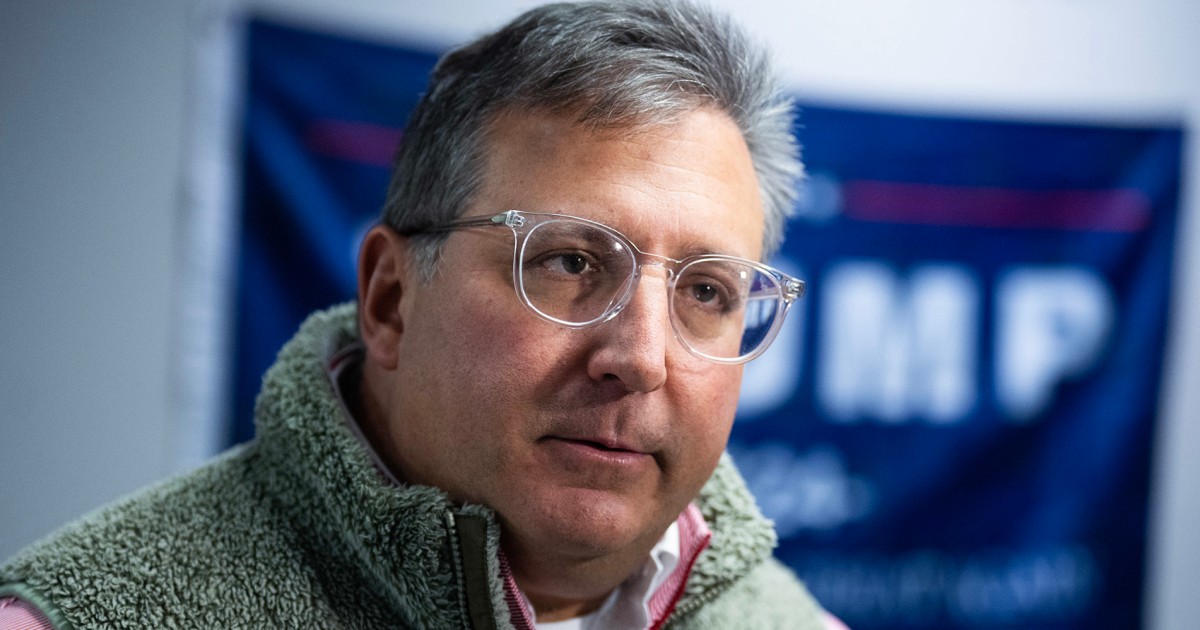Utah
Utah-based tour operator files for bankruptcy: what’s next for those owed money for cancelled tours?

SOUTH JORDAN, Utah — In April, KSL told you about a Utah-based travel company that abruptly canceled overseas tours of many viewers without offering refunds. Thousands of dollars were paid, which prompted many calls to Get Gephardt. Now, that company has filed for bankruptcy protection. So, what happens next?
“They won’t email us. They won’t call us back,” Lynette Clark told us about her communications with tour operator Latter Day Travel.
Clark paid about $6,000 for a tour she booked with Latter Day Travel, but six months before departure, she got an email saying they canceled her tour because of inflation and higher travel costs.No refund. Just the promise of credit if there are “travel opportunities in the future.”
“I hope that we can get our money back,” she said.
“It’s a lot of money for us,” Laurel Bjornberg said when KSL spoke to her about a nearly identical cancellation email she received from the sister company, CruiseBuilder.
Laurel Bjornberg (left) and Lynette Clar (right). (KSL TV)
She said she paid $4,700 for her tour and, like Clark, no refund.
“We paid for our trip, and we have nothing,” she said.
KSL tried by phone, email, and stopping by the business address, but the KSL Investigators were never able to get answers from the company about what happened to the money paid.

Gephardt knocks at the empty office of CruiseBuilder in April (KSL TV)
Now, in a bankruptcy filing from Project Neptune – also known as Latter Day Travel, Cruisebuilder, Vacationbuilder, Just LDS, Jungle Reef Tours, Renew, Come Sail Away, and www.costacruisepack.com – KSL learned that Clark and Bjornberg are far from being the only ones in the same boat.
The filing lists 2,232 people who could have a claim because of a canceled trip. They are listed as non-priority, unsecured creditors.
Notice was sent via first-class mail to all these folks and other creditors on Sept. 1st. If you are one of them, just receiving that notice does not mean you are automatically part of any settlement agreement. You must file proof of your claim with the Utah Bankruptcy Court by Nov. 3rd.
KSL also found in the bankruptcy filing that Project Neptune lists $100,015, but it owes over $2.6 million towards unsecured claims. A bankruptcy attorney KSL spoke with about this filing said he is not confident people like Bjornberg and Clark will get their money back.
Project Neptune filed for Chapter 11 bankruptcy. This allows it to re-shape itself and to keep running while it comes up with some game plan to repay those debts.

Utah
Should Utah's state employees return full time to the office? What Gov. Spencer Cox says about changing the work from home policy
Gov. Spencer Cox is about to overhaul Utah’s remote work policy for state employees.
But during his monthly PBS Utah news conference Thursday, the governor stopped short of saying whether he’s going to order state government workers to return to the office full time.
“We’re still working on that and we’ll have more to announce on that soon,” Cox said, adding that since the COVID-19 pandemic, the state has “been bringing more and more people back into the office. So we’ll continue to evaluate where it works and where it doesn’t.”
Approximately 40% of state government’s more than 22,400 employees are eligible to work from home but exactly how many do is not being tracked. Last year, many state workers were told they must be in the office at least two days a week.
“Remote work has its place. But so does being together,” the governor said. “That’s another thing that we learned during the pandemic. It’s not healthy to be isolated. We need that feedback, we need that interaction that comes not just from doing your work.”
He said it’s also important “to say ‘hi’ when you go to the water cooler or the restroom, and being able to get in a room together and just be able to talk and look at each other face-to-face. That matters. So those are the things that we’re working through right now.”
Cox, who once called himself “a televangelist for telework,” promised “there will be more to come.”
Before the pandemic, which had both private and public sector employees working from home, Utah had been encouraging what was known as telework for state employees as a way to save money on building or leasing office space.
Cox, who helmed the state’s pilot teleworking program in 2018 as lieutenant governor, said Thursday it “was very successful. It showed remote work can work if it’s done in the right ways. You don’t just send people home with a computer. It’s much more detailed than that.”
The pilot program showed what’s needed is “incredible oversight. You have to have different training. You have to have an area of your house that is set aside specifically for work so you have an actual workspace that had to be approved and compliant,” he said.
When those criteria are met, the governor said “we see actually an increase in productivity.”
But when the pandemic struck in 2020, “we didn’t have those same things in place for the thousands of workers who were working remotely,” he said. Now when it comes to the state’s telework program, the governor said, “parts of it are working. I think parts of it aren’t.”
The prospect of cutting government costs through shared workspaces and “getting rid of some of the leases that are very expensive” remains a priority, Cox said. State agencies are currently reviewing future space needs.
“What we’re trying to do is to figure out, how do we save taxpayer money by using less space and how do we make sure that the employees that are working on behalf of the taxpayers are efficient and productive,” he said, while “giving them as many opportunities as possible.”
Utah
Gordon Monson: The once-proud Delta Center is now haunted, plagued by the ghosts and ghouls of losing

The Utah Jazz have the worst home win percentage in the NBA, with just three wins.
The Utah Hockey Club has the worst home win percentage in the NHL, with just six wins.
Well, well. How the NBA’s mighty fortress in Utah has fallen. And, as it turns out now, the NHL’s, too, not that so far it ever really had much of a chance to stand firm.
The Delta Center used to be a favored place — a palace — for the Jazz to play and a dreaded place — a pit — for opposing NBA teams to try to survive, let alone get a win.
Visiting players hated playing there for a whole lot of reasons, foremost among them, they knew they had only a scant shot at victory. They knew it and the Jazz knew it, and the fans knew it. The cinder blocks in the walls and the steel girders in the roof, where the crowd noise of what sounded like a squadron of F-22 fighters taking off ricocheted from every hard surface in the arena, knew it.
Oh, what used to be.
A poll taken by Sports Illustrated among active players in 2008 ranked the Delta Center as “the most intimidating arena in the NBA.”
It had been that way since the early ‘90s, when Larry built the joint.
Maybe you remember, the place was a looney bin. It wasn’t just the building, although the basic structure was intended primarily for basketball, what with fans seated all snug to the floor, courtside and along the end lines, and the hovering seats ascending upward from there. Man, the fans were loud. More than loud, they were rowdy and raucous and … motivated. It was as though all Utahns had their identity wrapped up in every game’s result. If the Jazz won, people around here truly felt better about themselves, about who they were and what they were all about.
(Francisco Kjolseth | The Salt Lake Tribune) Bear smokes out a Calgary Flames fan during an NHL hockey game against the Utah Hockey Club at the Delta Center in Salt Lake City on Wednesday, Oct. 30, 2024.
The Jazz were them, and they were the Jazz. Many of those fans still show up — out of boredom, out of sympathy, out of self-loathing, but healthy self-esteem nowadays is in the shortest of supply.
This is now, that was then. The entire experience at the Delta Center has flipped.
What once had even ultra-competitive opponents like Michael Jordan and Kobe Bryant finding themselves swamped in the environment — although for them it often stirred their best talents — for more than a few lesser players, the Delta Center’s force of personality, for lack of a better way of describing it, crushed them.
Yeah, it helped that the Jazz often had stellar teams taking the floor, teams that were, as mentioned, fairly convinced they were going to win even before they left the locker room. I once asked Antoine Carr, as he sat in front of his locker in the minutes before the opening tip what the odds were that the Jazz would triumph that night. He responded with a question of his own: “Where we playing?”
“Right here,” I answered.
“Nuff said,” Big Dawg barked.
And, sure enough, the victorious hounds were released, same as it ever was.
Back in those years, many years, the Jazz finished with home records of 36-5, 33-8, 34-7, 37-4, 38-3. As recently as 2020-21, the Jazz were 31-5 at home. According to Statmuse, the Jazz’s all-time home record is 1,375-657, which, of course, includes some games played outside the Delta Center. But you get the idea.
It’s a place where you can bet on them winning.
Could.
Not anymore.
The Jazz thus far this season are 3-14 at home. The sounds of those jets launching have grown if not silent, a bit quieter. It’s not even the fans’ fault, though. They’re doing what they can, trying to give the Jazz a lift. The fact that the Jazz draw as well as they do given the circumstances is remarkable. The crowd’s energy, or at least its effectiveness, more often than not surpasses what the team offers.
When the midseason juncture approaches, and the Jazz have just a few home wins to show for it, all you can say is, “Tanks,” or “No tanks,” depending on where you stand on the issue of the Jazz not really trying to win, as a means to win much more in the seasons ahead with added draft talent.
The thing is, even without a tanking effort going on, the same home-stumbling phenomenon is happening to the Utah Hockey Club. It shares the Jazz’s dubious designation, just not quite as lousy, with a home mark of 6-10-4.
Game one at the Delta Center, between the Utah Jazz and the Chicago Bulls in the NBA finals in Salt Lake City
Salt Lake Tribune Staff Photo
You can almost see the tears rolling down out of the weeping windows of the Delta Center. The proud competitive chateau has turned into a sorry sagging shack, even as plans for more renovation are already underway.
Hockey gets a pass, considering it is new to the premises. And perhaps the Jazz do, too, since their bosses decided they were brilliant enough to disassemble a playoff team that they saw as not quite good enough — without enough financial flexibility in it — to then out-maneuver everybody else in the NBA to make an eventual move upward.
That doesn’t mean the building has to like it. I’m thinking the place is haunted now. That’s the feeling I get when I walk through the doors. The ghosts of past 50-plus-win seasons are floating hither and thither, making a racket, being chased around and off by sub-.500 spirits.
The specters and spooks of losing will do that. They’re doing it now. And the only exorcism that will save the Delta Center is …
Ownership and management being as smart as they think and thought they were, smart enough to be worthy of the place they call home.
(Trent Nelson | The Salt Lake Tribune) Utah Jazz guard Collin Sexton (2) at the end of the third quarter, behind by 24 (100-76), as the Utah Jazz host the Denver Nuggets, NBA basketball in Salt Lake City on Wednesday, Nov. 27, 2024.
Utah
What Utah offensive coordinator Jason Beck said about roster moves

The Utah Utes have undergone a significant offensive overhaul this offseason, spearheaded by the arrival of new offensive coordinator Jason Beck. Following a disappointing 2024 campaign that ended with a seven-game losing streak—the longest in Kyle Whittingham’s tenure—the program made drastic changes to revitalize its offense and position itself for success in the Big 12.
Beck, who most recently served as the offensive coordinator at New Mexico, stepped into a demanding situation with the Utes. His hiring marked the first change at the position since 2019, following Andy Ludwig’s midseason resignation. Beck faced immediate challenges, including the departure of all scholarship running backs from the 2024 roster and the need to navigate the transfer portal to rebuild the offense. Among the new additions was quarterback Devon Dampier, who followed Beck from New Mexico, signaling continuity in Beck’s offensive vision.
Beck’s offensive system is designed with adaptability and simplicity in mind, making it easier for players to grasp in a single offseason. At New Mexico, his system leaned heavily on the run-pass option (RPO) and quarterback runs. Dampier thrived in this setup, recording 1,166 rushing yards and 19 touchdowns, alongside 2,768 passing yards, 12 touchdowns, and 12 interceptions in 2024. The expectation is that a similar system will be implemented in Salt Lake City, with an emphasis on playing to the strengths of the personnel.
Whittingham praised Beck’s ability to tailor his schemes to the talent on the roster. “Jason is a really good judge of talent, who to use to get the most out of each guy and tweaking things to fit the personnel,” Whittingham said. Beck echoed this sentiment, emphasizing a quarterback-centered approach. “It’s all about identifying the best players and putting them in positions to have success,” Beck explained.
Dampier’s dual-threat abilities bring excitement to the Utes’ offense, but there is room for growth. His 57.9% completion rate at New Mexico ranked among the lowest in Division I football, and he also struggled with turnovers. Both Beck and Whittingham are confident Dampier will mature in these areas.
Kyle Whittingham says NIL was ‘overriding’ factor for two key transfers
“We expect to get his completion percentage bumped up a little bit this year,” Whittingham noted, attributing anticipated improvements to increased familiarity with the system. Beck highlighted Dampier’s leadership as a key asset, saying, “His example will help the other guys and show what it’s supposed to look like at a high level.”
Beck wasted no time building Utah’s roster via the transfer portal. One of the most significant additions was running back Wayshawn Parker from Washington State. Parker, who rushed for 735 yards and four touchdowns as a freshman, is expected to be a cornerstone of the new offense. “He’s a tough, physical running back with great upside,” Whittingham said.
The Utes are also working to retain wide receiver Dorian Singer, who is petitioning the NCAA for an additional year of eligibility. If successful, Singer’s return would provide a substantial boost to the receiving corps.
While Beck’s offense at New Mexico utilized tight ends sparingly, he is prepared to adjust at Utah. “If it’s a strength, tight end play, then we’ll play with two tight ends,” Beck said, emphasizing his commitment to maximizing the team’s talent.
Urban Meyer will be inducted into College Football Hall of Fame in 2025
With spring camp on the horizon, Beck is tasked with implementing his system and finalizing the roster. Despite the challenges, Beck is optimistic about the opportunity. “What a great opportunity to be a part of such a great program,” he said, expressing enthusiasm for the Utes’ storied tradition and potential for success.
As Beck and the Utes embark on this new chapter, there is hope that the offensive overhaul will yield immediate results and set the stage for a resurgence in 2025.
-
/cdn.vox-cdn.com/uploads/chorus_asset/file/25822586/STK169_ZUCKERBERG_MAGA_STKS491_CVIRGINIA_A.jpg)
/cdn.vox-cdn.com/uploads/chorus_asset/file/25822586/STK169_ZUCKERBERG_MAGA_STKS491_CVIRGINIA_A.jpg) Technology1 week ago
Technology1 week agoMeta is highlighting a splintering global approach to online speech
-

 Science5 days ago
Science5 days agoMetro will offer free rides in L.A. through Sunday due to fires
-
/cdn.vox-cdn.com/uploads/chorus_asset/file/25821992/videoframe_720397.png)
/cdn.vox-cdn.com/uploads/chorus_asset/file/25821992/videoframe_720397.png) Technology1 week ago
Technology1 week agoLas Vegas police release ChatGPT logs from the suspect in the Cybertruck explosion
-

 Movie Reviews1 week ago
Movie Reviews1 week ago‘How to Make Millions Before Grandma Dies’ Review: Thai Oscar Entry Is a Disarmingly Sentimental Tear-Jerker
-

 News1 week ago
News1 week agoPhotos: Pacific Palisades Wildfire Engulfs Homes in an L.A. Neighborhood
-

 Business1 week ago
Business1 week agoMeta Drops Rules Protecting LGBTQ Community as Part of Content Moderation Overhaul
-

 Politics1 week ago
Politics1 week agoTrump trolls Canada again, shares map with country as part of US: 'Oh Canada!'
-

 Education1 week ago
Education1 week agoFour Fraternity Members Charged After a Pledge Is Set on Fire


















